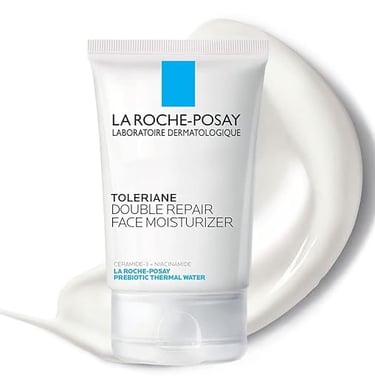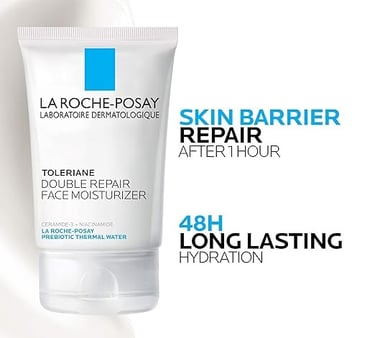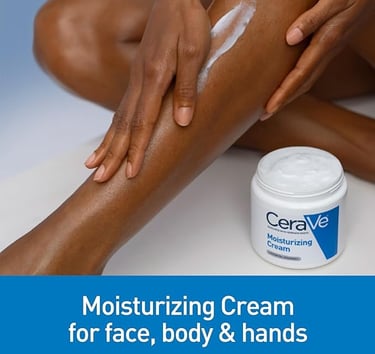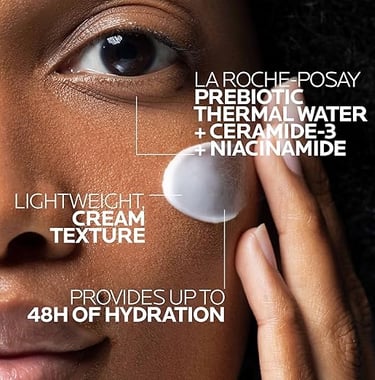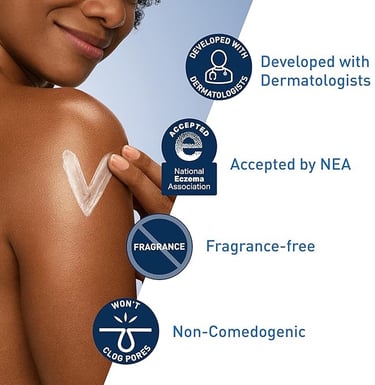CeraVe vs. La Roche-Posay: Which Moisturizer Is Best for Sensitive Skin?
Wondering which drugstore moisturizer is best for sensitive skin? This in-depth comparison of CeraVe vs. La Roche-Posay breaks down ingredients, benefits, and results to help you choose the right formula for your skin type.
SKINCARE
Zora M.
7/11/20254 min read
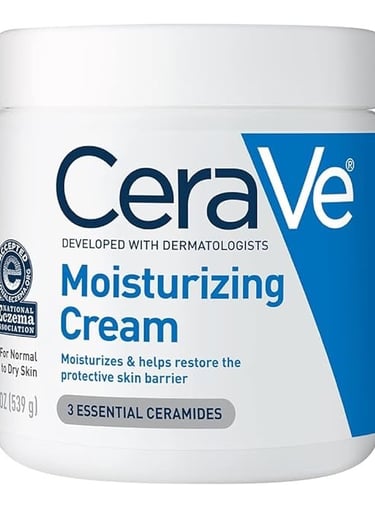

Affiliate Disclosure:
This post contains affiliate links. If you click through and make a purchase, we may earn a small commission—at no extra cost to you. We only recommend products we trust and use ourselves.
CeraVe vs. La Roche-Posay: Which Drugstore Moisturizer Is Best for Sensitive Skin?
When it comes to drugstore skincare, CeraVe and La Roche-Posay are two standout brands trusted by dermatologists and skincare lovers alike. But which one is actually better for sensitive skin? We put their top moisturizers—CeraVe Moisturizing Cream and La Roche-Posay Toleriane Double Repair Face Moisturizer—head-to-head to help you decide.
What Is CeraVe Moisturizing Cream?
CeraVe Moisturizing Cream is a rich, fragrance-free moisturizer designed to restore the skin’s natural barrier and provide long-lasting hydration. It’s marketed toward those with dry to very dry skin, including people dealing with eczema or sensitivity.
Claims to do: Hydrate, soothe, and restore the skin barrier with essential ceramides and hyaluronic acid.
Target audience: All ages and skin types, but especially dry or sensitive skin.
What Is La Roche-Posay Toleriane Double Repair Face Moisturizer?
La Roche-Posay’s Toleriane Double Repair is a lightweight daily moisturizer that hydrates while supporting the skin’s microbiome. It’s ideal for sensitive, oily, or acne-prone skin types.
Claims to do: Provide 48-hour hydration, help restore the skin barrier, and visibly improve skin texture.
Target audience: Sensitive, combination, and oily skin types—especially those who need lightweight hydration.
Key Features / Benefits
Contains 3 essential ceramides to restore skin barrier
Hyaluronic acid draws in moisture
Developed with dermatologists
Accepted by the National Eczema Association
Multi-use: face and body
La Roche-Posay Toleriane Double Repair
Features prebiotic thermal water to soothe inflammation
Contains niacinamide to calm and brighten skin
Oil-free and lightweight
Replenishes skin microbiome balance
Works well under makeup
What’s Included / Product Specs
CeraVe:
Size: 16 oz jar (also available in 8 oz and travel size)
Longevity: 1 jar lasts 1–2 months with daily use
Packaging: Functional and simple, no pump
La Roche-Posay:
Size: 2.5 oz pump bottle
Longevity: Lasts 3–4 weeks with twice-daily use
Packaging: Hygienic pump design, travel-friendly
How to Use It
CeraVe:
Cleanse face or body
Apply a thin layer morning and/or night
Reapply as needed to dry patches
Tip: Works great after a shower to lock in moisture.
Cleanse skin
Apply 1–2 pumps morning and evening
Follow with SPF in the AM
Tip: Ideal base for makeup and sunscreen.
My Experience / Testing Period
I tested both moisturizers for two weeks each:
CeraVe: My dry patches vanished within 3 days. The texture was thick but soothing. It absorbed slowly but deeply.
La Roche-Posay: My skin felt instantly smooth. It absorbed fast, didn’t pill under sunscreen, and kept my skin hydrated without feeling greasy.
Both integrated easily into my skincare routine. I used La Roche-Posay during the day and CeraVe at night.
Results: Does It Work?
CeraVe noticeably reduced flakiness and irritation. My skin felt stronger, especially around my cheeks and nose.
La Roche-Posay kept my skin hydrated throughout the day without shine. Redness around my T-zone reduced by the end of week one.
Both lived up to their claims, but the difference comes down to skin type and texture preference.
Side Effects or Issues
CeraVe: Slightly greasy feeling for oily skin types; may clog pores if applied too heavily.
La Roche-Posay: None observed, but it may not be rich enough for very dry or mature skin.
Tip: Start with a patch test if your skin is highly reactive.
Who Should Use This Product?
Best for dry, flaky, or eczema-prone skin
Ideal for those wanting a multi-use moisturizer (face + body)
Not ideal for oily skin types in humid climates
Best for sensitive, combination, or oily skin
Great for acne-prone skin
Not ideal if you need an ultra-rich formula
Price & Value
CeraVe Moisturizing Cream: ~$17–20 for 16 oz
Great value, especially considering it can be used on the face and body.La Roche-Posay Toleriane: ~$20–25 for 2.5 oz
Higher cost per ounce, but delivers lightweight hydration and high performance.
Pros and Cons
CeraVe Moisturizing Cream
Pros
Rich hydration
Great for eczema or barrier repair
Budget-friendly
Cons
Can feel heavy
Not ideal for oily skin
La Roche-Posay Toleriane
Pros
Lightweight and fast-absorbing
Reduces redness
Non-comedogenic
Cons
More expensive per ounce
May not be hydrating enough for dry skin
Final Verdict
Both products are excellent, but they cater to different skin needs:
Choose CeraVe Moisturizing Cream if you want deep, lasting hydration and your skin tends to be dry or reactive.
Choose La Roche-Posay Toleriane Double Repair if you prefer a lighter texture and need hydration without heaviness—especially for sensitive or breakout-prone skin.
Rating:
CeraVe: ⭐⭐⭐⭐☆ (8.5/10)
La Roche-Posay: ⭐⭐⭐⭐☆ (8.7/10)
Want to Try Them Yourself?
Shop the product that best supports your skin goals—just tap the link below.
CeraVe: https://amzn.to/4eOfIt9
La Roche-Posay: https://amzn.to/4edKYBt
Both are Great Choices—what matters most is finding what makes your skin feel its best!
